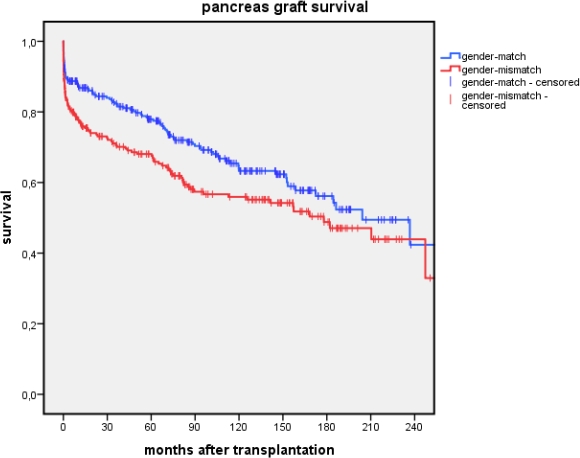Effect of Donor-Recipient Gender-Mismatch on Long Term Function after Pancreas Transplantation
1Visceral, Transplant and Thoracic Surgery, Medical University of Innsbruck, Innsbruck, Austria
2Medical Statistics, Informatics and Health Economics, Medical University of Innsbruck, Innsbruck, Austria.
Meeting: 2018 American Transplant Congress
Abstract number: A339
Keywords: Pancreas transplantation
Session Information
Session Name: Poster Session A: Pancreas and Islet: All Topics
Session Type: Poster Session
Date: Saturday, June 2, 2018
Session Time: 5:30pm-7:30pm
 Presentation Time: 5:30pm-7:30pm
Presentation Time: 5:30pm-7:30pm
Location: Hall 4EF
Background: Several studies in solid organ transplantation have shown a correlation between gender-match and risk of graft loss. In this study we aimed to analyze the impact of recipient and donor sex on the incidence of pancreas graft loss in our cohort.
Methods: We performed a retrospective analysis including all pancreas transplants performed between January 1979 and December 2016 at the Medical University of Innsbruck. After exclusion of patients with loss to follow-up, 537 patients could be included in the analysis. Median follow-up time was 116 (range 0.6 – 389) months.
Results: Of the 537 pancreas transplant recipients 199 (37.1%) were female and 338 (62.9%) were male. In 290 (54%) cases a gender-matched and in 247 (46%) cases a gender-mismatched transplant was performed. Kaplan-Meier analysis revealed a significantly superior pancreas graft survival (p = 0.015) in the gender-matched group. Pancreas graft survival at 5 and 10 years was 79,9% and 63,3% in the gender-matched group compared to 68.1% and 55.9% in the mismatched group. No difference in patient survival could be observed. After division of the different donor-recipient sex constellations only the male-donor-to-male-recipient group had a significant better pancreas graft survival than the female-donor-to-male-recipient group (p = 0.019). Significantly more patients in the male-donor-to-female-recipient group lost their graft (13.2% vs. 4.9%; p=0.005) to acute rejection early after transplantation (mean 27 months).
Discussion: Our analysis shows that gender-matched pancreas transplantations lead to a significant better long term graft survival. Early graft loss due to acute rejection is significantly more frequent in the male-donor-to-female-recipient group. Factors which might influence this result are a higher recipient and lower donor age in the gender-matched group.
CITATION INFORMATION: Messner F., Bösmüller C., Maglione M., Riedmann M., Oberhuber R., Cardini B., Resch T., Schneeberger S., Margreiter C. Effect of Donor-Recipient Gender-Mismatch on Long Term Function after Pancreas Transplantation Am J Transplant. 2017;17 (suppl 3).
To cite this abstract in AMA style:
Messner F, Bösmüller C, Maglione M, Riedmann M, Oberhuber R, Cardini B, Resch T, Schneeberger S, Margreiter C. Effect of Donor-Recipient Gender-Mismatch on Long Term Function after Pancreas Transplantation [abstract]. https://atcmeetingabstracts.com/abstract/effect-of-donor-recipient-gender-mismatch-on-long-term-function-after-pancreas-transplantation/. Accessed July 18, 2025.« Back to 2018 American Transplant Congress

